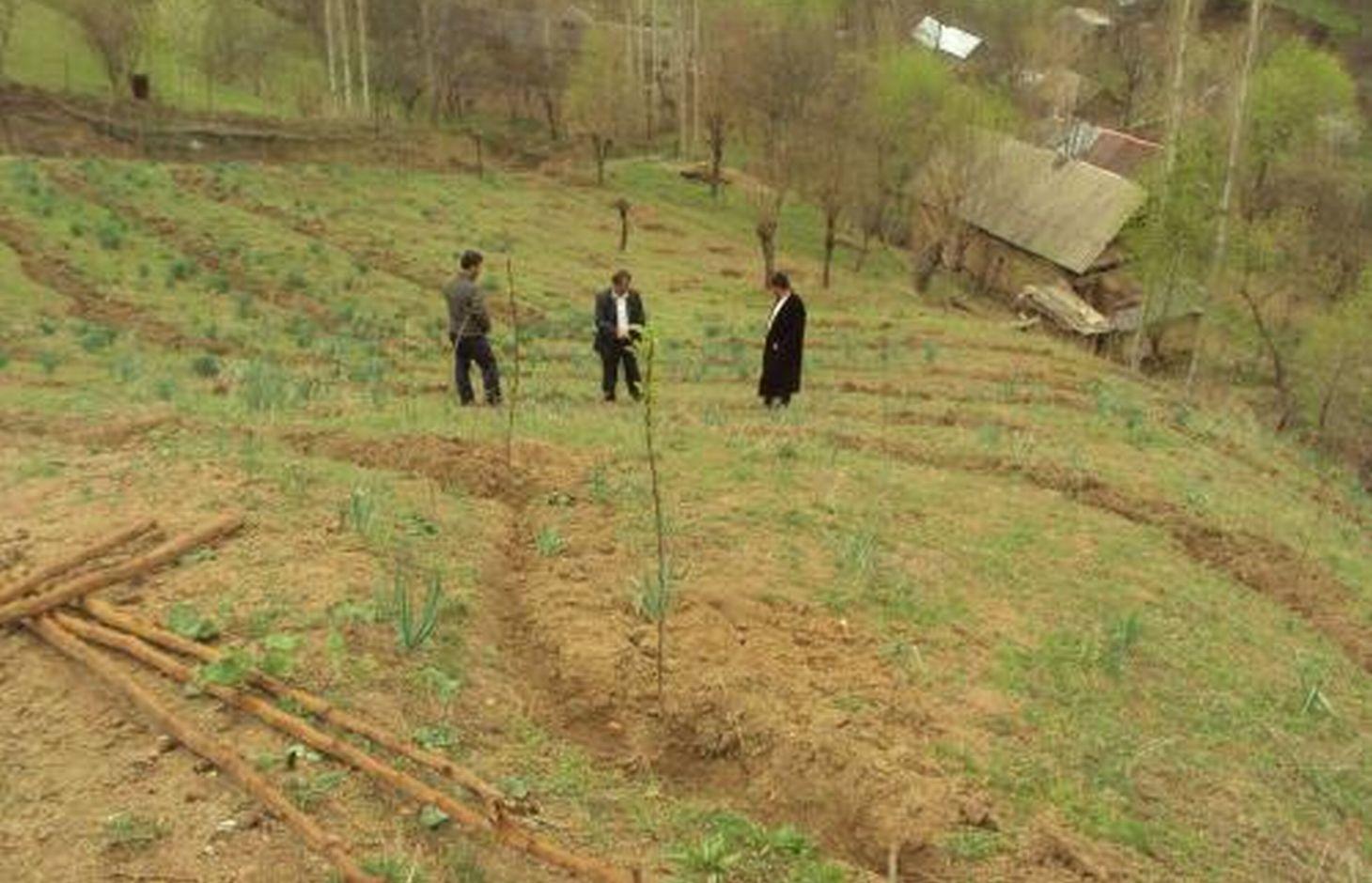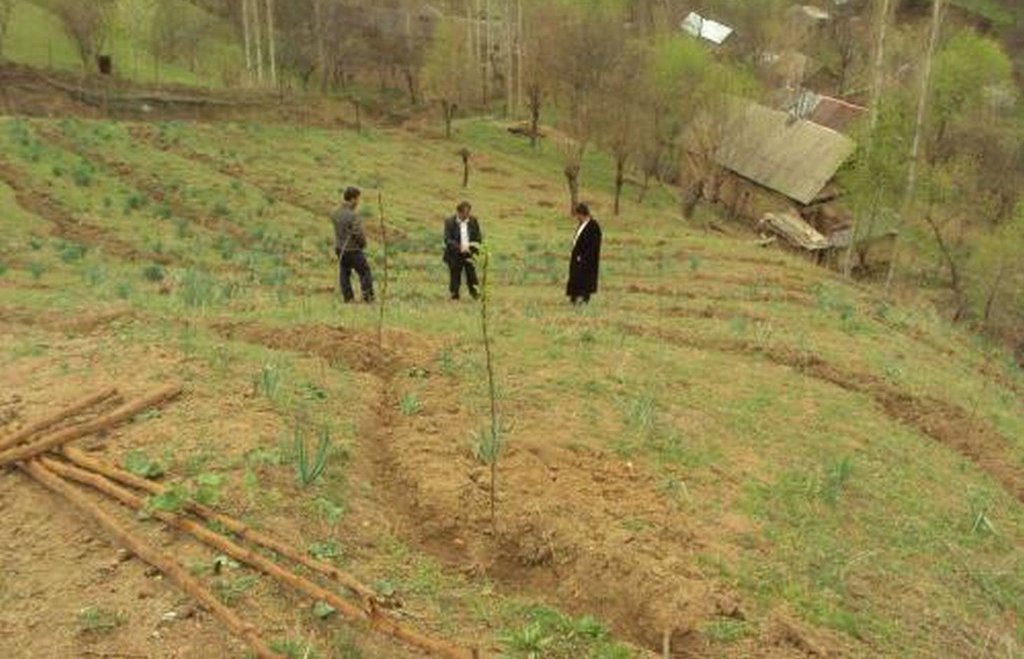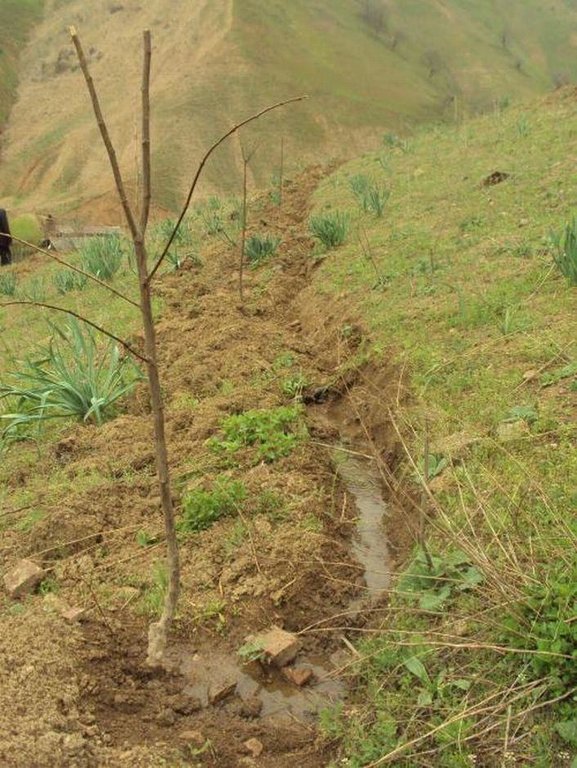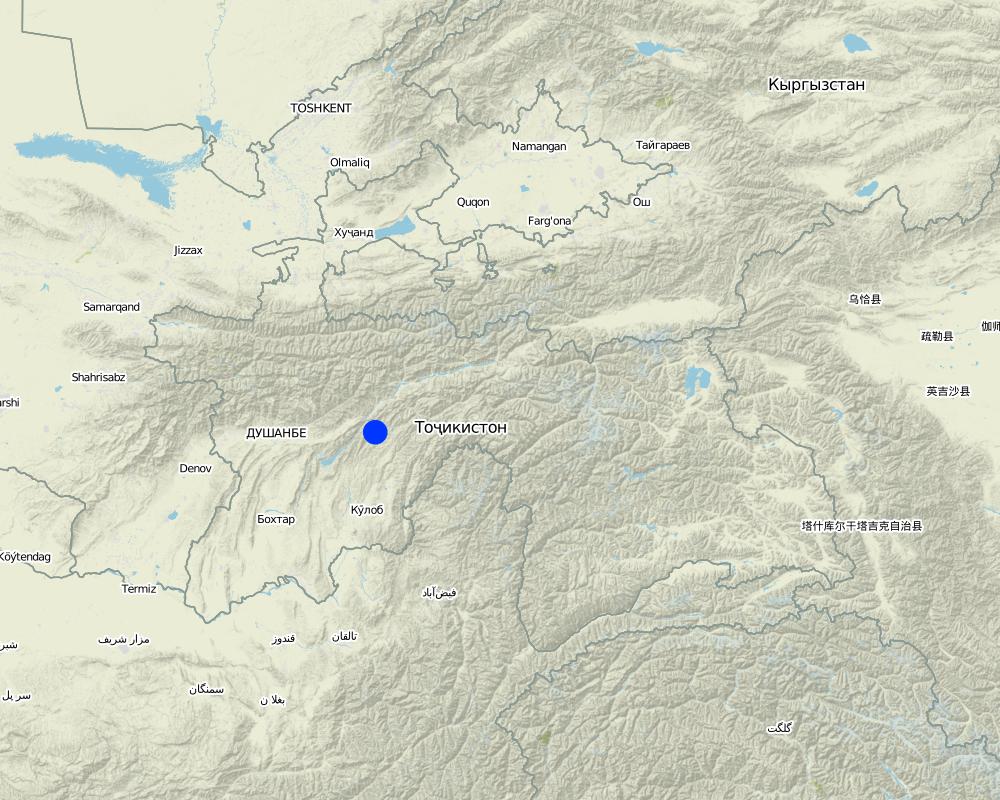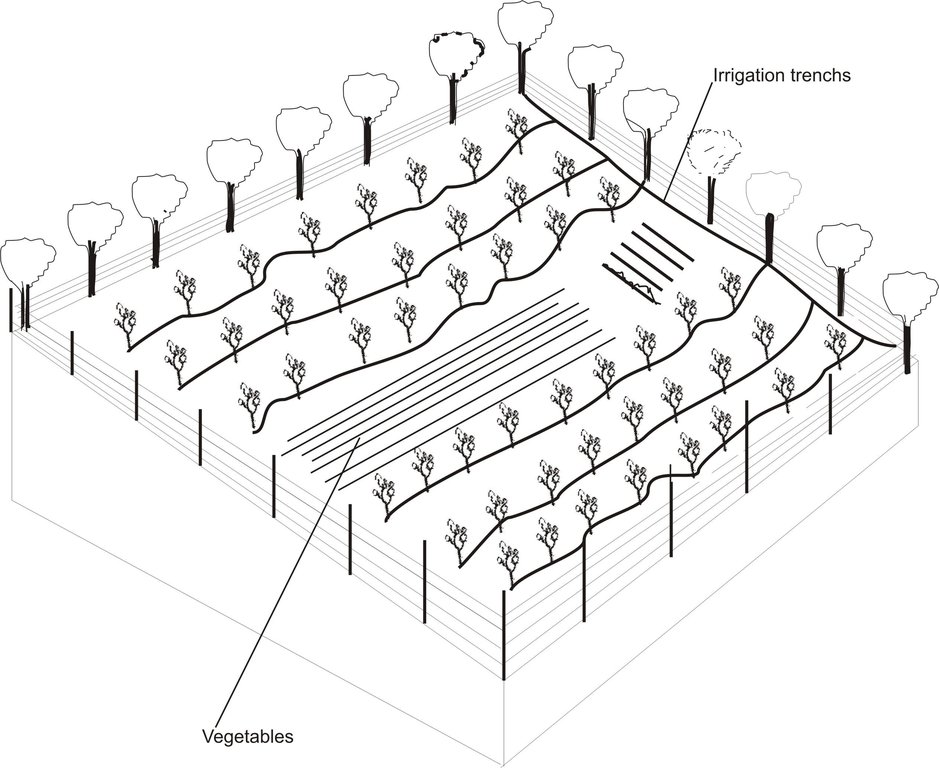Planting of fruit trees to increase slope stabilisation [طاجيكستان]
- تاريخ الإنشاء:
- تحديث:
- جامع المعلومات: Gulniso Nekushoeva
- المحرر: –
- المراجعون: Alexandra Gavilano, David Streiff
Табдил додани чарохгох ба бог
technologies_1520 - طاجيكستان
- Planting of fruit trees to increase slope stabilisation: 20 أغسطس، 2019 (inactive)
- Planting of fruit trees to increase slope stabilisation: 2 نوفمبر، 2021 (public)
- Planting of fruit trees to increase slope stabilisation: 20 يوليو، 2017 (inactive)
- Planting of fruit trees to increase slope stabilisation: 22 يوليو، 2017 (inactive)
- Planting of fruit trees to increase slope stabilisation: 15 مارس، 2017 (inactive)
عرض الأقسام
توسيع الكل طي الكل1. معلومات عامة
1.2 تفاصيل الاتصال بالأشخاص الرئيسيين لمصدر المعلومات والمؤسسات المشاركة في تقييم وتوثيق التقنية
متخصص في الإدارة المستدامة للأراضي:
متخصص في الإدارة المستدامة للأراضي:
اسم المؤسسة (المؤسسات) التي سهلت توثيق/تقييم التقنية (إذا كان ذلك على صلة)
NCCR North-South (NCCR North-South) - قرغيزستاناسم المؤسسة (المؤسسات) التي سهلت توثيق/تقييم التقنية (إذا كان ذلك على صلة)
Tajik Academy of Agricultural Sciences (Tajik Academy of Agricultural Sciences) - طاجيكستاناسم المؤسسة (المؤسسات) التي سهلت توثيق/تقييم التقنية (إذا كان ذلك على صلة)
Tajik Soil Insitute (Tajik Soil Institute) - طاجيكستاناسم المؤسسة (المؤسسات) التي سهلت توثيق/تقييم التقنية (إذا كان ذلك على صلة)
CAMP - Central Asian Mountain Partnership (CAMP - Central Asian Mountain Partnership) - قرغيزستان1.3 الشروط المتعلقة باستخدام البيانات الموثقة من خلال WOCAT
يوافق جامع المعلومات والشخص (لاشخاص) الرئيسي لمصدر المعلومات على الشروط المتعلقة باستخدام البيانات الموثقة من خلال WOCAT:
نعم
2. وصف تقنيةالإدارة المستدامي للأراضي
2.1 وصف مختصر للتقنية
تعريف التقنية:
Planting fruit tree orchards to increase the stability of the steep loess soil slopes.
2.2 وصف تفصيلي للتقنية
الوصف:
This technology involved the planting of several varieties of native fruit trees to help stabilise steep loess mountain slopes. Seven species of fruit trees were planted in seven different locations, in two watersheds within the district of Nurobod in Tajikistan. The locations were chosen as a result of a natural disaster workshop that identified the areas most susceptible to landslides.
In consultation with the Institute of Horticulture a fruit tree planting scheme was devised and using project money the identified area was enclosed with a wire perimeter fence. The fruit trees were planted along irrigation contours running at shallow angles parallel to the slope.
Purpose of the Technology: The best locations for planting the fruit trees were decided on via a participatory community workshop on natural disaster risk management.
During the workshop the community identified areas around the village that were considered high risk. A fruit tree planting scheme was implemented in these areas to help stabilise the slopes, reduce surface water run off and top soil erosion, and reduce the risk of landslides. As the trees grew they were intercropped with wheat and espercet.
Establishment / maintenance activities and inputs: Several 'at risk' areas were identifed within these workshops, therefore the project team had to assess the areas for suitability. Two of the main criteria used included the access to water and if there was sufficient depth of top soil to sustain a fruit orchard.
Once the area was decided upon, a Memorandum of Understanding (MoU) was signed with the particular land user. It was made clear to the community that the land was chosen based upon the decisions from the workshop and not because of any form of favouritism towards the land user. The MoU stated that the land user was responsible for the planting and maintenance of the orchards.
The Horticultural Institute devised a planting a scheme based upon the loaction and soil type. The implementation activities occurred in early spring. A continuos wire fence was erected around the area, and the fruit trees were planted at five metre intervals along a dug contour irrigation ditch. One kilo of organic fertiliser was applied to each tree and later in the season they were sprayed with pesticides.
Natural / human environment: Nurobod district is a mountainous area, with large tributaries flowing into the Vasht river. There are mass erosion processes at work, causing gullies and washing away the top soil. The previous civil war, compounded by harsh winters resulted in extensive clearance of the surrounding vegetation for fuel. These areas have became further degraded by over grazing on the remaining grass lands.
The local population suffers from high levels of labour migration of young men to Russia and resulting in a drain of knowledge and able bodied workers. This leaves the remaining families particulary vulnerable in this specific climate.
2.3 صور التقنية
2.5 البلد/المنطقة/المواقع التي تم تنفيذ التقنية فيها والتي يغطيها هذا التقييم
البلد:
طاجيكستان
المنطقة/الولاية/المحافظة:
Tajikistan
مزيد من التفاصيل حول الموقع:
Nurobod
حدد انتشار التقنية:
- منتشرة بالتساوي على مساحة
إذا كانت المساحة الدقيقة غير معروفة، فيرجى الإشارة إلى المنطقة التقريبية المغطاة:
- < 0.1 كم2 (10 هكتار)
التعليقات:
Total area covered by the SLM Technology is 0.1 m2.
The SLM technology was implemented in 7 different locations covering 5 villages within the Mujiharf and Hakimi jamoats of Nurobod District. The two main watersheds are shown in the googleEarth file. The plot sizes varied between 0.5 - 1 H.a.
Map
×2.6 تاريخ التنفيذ
في حالة عدم معرفة السنة بالتحديد، يرجى الإشارة إلى التاريخ التقريبي:
- منذ أقل من 10 سنوات (مؤخرًا)
2.7 إدخال التقنية
حدد كيف تم إدخال التقنية:
- من خلال المشاريع/ التدخلات الخارجية
التعليقات (نوع المشروع، الخ):
The project was implemented in 2010.
3. تصنيف تقنية الإدارة المستدامي للأراضي
3.1 الغرض الرئيسي ( الأغراض الرئيسية) للتقنية
- الحد من تدهور الأراضي ومنعه وعكسه
- الحد من مخاطر الكوارث
3.2 نوع (أنواع) استخدام الأراضي الحالية حيث يتم تطبيق التقنية

الأراضي الزراعية
- زراعة سنوية
- زراعة الأشجار والشجيرات
الزراعة السنوية - حدد المحاصيل:
- الحبوب - قمح (ربيعي)
- espercet
زراعة الأشجار والشجيرات -حدد المحاصيل:
- فواكه أخرى
- الفواكه ذات النواة (الخوخ، المشمش، الكرز، البرقوق، الخ)
- أشجار الجوزيات (جوز البرازيل، الفستق، الجوز، اللوز، الخ.)
- الثمار التفاحية (التفاح، الكمثرى، السفرجل، الخ)
هل يتم ممارسة الزراعة البينية؟:
نعم
إذا كانت الإجابة بنعم، حدد المحاصيل التي يتم زراعتها بشكل بيني:
wheat and espercet
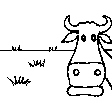
أراضي الرعي
الرعي الواسع النطاق:
- مربى ماشية محدد
نوع الحيوان:
- الماعز
- ماشية - الألبان
- الأغنام
- Livestock density (if relevant): 1-10 LU /km2
التعليقات:
Major land use problems (compiler’s opinion): The steep loess slopes are devoid of vegetation, therefore the land is prone to washing away of top soil, gulley formation, and potential landslides.
Major land use problems (land users’ perception): The land has become unuseable, it was used as pasture land but every year it seems to be getting worse.
Ranching: cows, sheep and goats
Future (final) land use (after implementation of SLM Technology): Forests / woodlands: Fp: Plantations, afforestations
3.3 هل تغير استخدام الأراضي نتيجة لتنفيذ التقنية؟
هل تغير استخدام الأراضي نتيجة لتنفيذ التقنية؟:
- نعم (يرجى ملء الأسئلة أدناه فيما يتعلق باستخدام الأراضي قبل تنفيذ التقنية)

أراضي الرعي
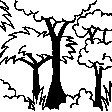
الغابات/ الأراضي الحرجية
- زراعة الأشجار، التشجير
التعليقات:
Future (final) land use (after implementation of SLM Technology): Forests / woodlands: Fp: Plantations, afforestations
Grazing land: Ge: Extensive grazing land
3.4 إمدادات المياه
إمدادات المياه للأرض التي يتم تنفيذ التقنية عليها:
- مختلط بعلي-مروي
التعليقات:
Number of growing seasons per year:
1
Specify:
Longest growing period in days: 200Longest growing period from month to month: March - October
3.5 مجموعةالإدارة المستدامة للأراضي التي تنتمي إليها هذه التقنية
- التدابير المتقاطعة للمنحدرات
3.6 التدابير التقنية في مجال إلادارة المستدامة للأراضي
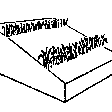
التدابير النباتية
- V1: غطاء من الأشجار والشجيرات
التعليقات:
Main measures: vegetative measures
Type of vegetative measures: aligned: -contour
3.7 الأنواع الرئيسية من تدهور الأراضي التي تناولتها التقنية

تآكل التربة بالمياه
- الوزن(Wt): فقدان التربة السطحية/تآكل السطح
- (Wg):الانجراف الخلجاني/ الخلجان
- (Wm): مجموعة كبيرة من الحركات الأرضية/انزلاقات أرضية
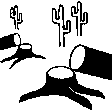
التدهور البيولوجي
- (Bc): تناقص الغطاء النباتي
التعليقات:
Main type of degradation addressed: Wt: loss of topsoil / surface erosion, Wg: gully erosion / gullying, Wm: mass movements / landslides
Secondary types of degradation addressed: Bc: reduction of vegetation cover
Main causes of degradation: deforestation / removal of natural vegetation (incl. forest fires) (Any shrubs and bushes previously on the land were removed.), over-exploitation of vegetation for domestic use (Shrubs and bushes were removed as fodder and for fuel purposes.), war and conflicts (Natural resources became increasingly valuable during the civil war of the 1990's.)
Secondary causes of degradation: overgrazing (Once the bushes were removed the area was used for grazing.), Heavy / extreme rainfall (intensity/amounts) (Heavy rainfall events have contributed to the degradation of the land.)
3.8 منع أو حد أو عكس تدهور الأراضي
تحديد هدف التقنية فيما يتعلق بتدهور الأراضي:
- الحد من تدهور الأراضي
- اصلاح/إعادة تأهيل الأراضي المتدهورة بشدة
التعليقات:
Secondary goals: prevention of land degradation
4. المواصفات الفنية، وأنشطة التنفيذ، والمدخلات، والتكاليف
4.1 الرسم الفني للتقنية
المواصفات الفنية (المتعلقة بالرسم الفني):
The drawing shows a perimeter fence enclosing terraces of fruit trees. The trees are irrigated through a contour trench running at a shallow angle perpendicular to the slope. The land users have taken the opportunity to optimise the cultivated land by planting perennial and wheat crops between the rows of trees.
Location: Mujiharf. Nurobod, tajikisatn
Date: 22nd June 2011
Technical knowledge required for field staff / advisors: low (The technology is relatively straight forward and easy to implement.)
Technical knowledge required for land users: low (The land user is responsible for the continued maintenance of the fruit trees.)
Main technical functions: improvement of ground cover
Secondary technical functions: control of dispersed runoff: retain / trap, control of dispersed runoff: impede / retard, spatial arrangement and diversification of land use
Aligned: -contour
Vegetative material: F : fruit trees / shrubs
Number of plants per (ha): 400
Vertical interval between rows / strips / blocks (m): 5
Spacing between rows / strips / blocks (m): 5
Vertical interval within rows / strips / blocks (m): 5
Width within rows / strips / blocks (m): 5
Fruit trees / shrubs species: Cherry, Apple, Quince, Pear, Plum, Peach, Walnut
Slope (which determines the spacing indicated above): 25.00%
Gradient along the rows / strips: 2.00%
المؤلف:
Pjotr M. Sosin, Camp Kuhiston, Dusahnbe
4.2 معلومات عامة بخصوص حساب المدخلات والتكاليف
عملة أخرى/ عملة وطنية (حدد):
somoni
إذا كان ذا صلة، وضح سعر الصرف من الدولار الأمريكي إلى العملة المحلية (على سبيل المثال، 1 دولار أمريكي = 79.9 ريال برازيلي): 1 دولار أمريكي =:
4,5
اذكر متوسط تكلفة أجر العمالة المستأجرة في اليوم الواحد:
25.00
4.3 أنشطة التأسيس
| النشاط | التوقيت (الموسم) | |
|---|---|---|
| 1. | Erection of Fence | Spring - end of march |
| 2. | Planting of fruit trees. | March / April |
4.4 التكاليف والمدخلات اللازمة للتأسيس
| تحديد المدخلات | الوحدة | الكمية | التكاليف لكل وحدة | إجمالي التكاليف لكل مدخل | % من التكاليف التي يتحملها مستخدمو الأراضي | |
|---|---|---|---|---|---|---|
| العمالة | Building fence | Persons/day | 28,0 | 25,0 | 700,0 | 100,0 |
| العمالة | Planting fruit trees | Persons/day | 40,0 | 25,0 | 1000,0 | 100,0 |
| معدات | Tools | Pieces | 6,0 | 20,0 | 120,0 | |
| المواد النباتية | Seedlimgs | pieces | 400,0 | 8,0 | 3200,0 | |
| الأسمدة والمبيدات الحيوية | Compost/manure | tons | 1,0 | 225,0 | 225,0 | 100,0 |
| الأسمدة والمبيدات الحيوية | 1,0 | |||||
| مواد البناء | Metal fence and posts | meter | 400,0 | 12,0 | 4800,0 | |
| إجمالي تكاليف إنشاء التقنية | 10045,0 | |||||
| إجمالي تكاليف إنشاء التقنية بالدولار الأمريكي | 2232,22 | |||||
إذا تحمل مستخدم الأرض أقل من 100% من التكاليف، حدد من قام بتغطية التكاليف المتبقية:
Horticulture Institue
التعليقات:
Duration of establishment phase: 2 month(s)
Costs are per h.a.
4.5 الصيانة/الأنشطة المتكررة
| النشاط | التوقيت/الوتيرة | |
|---|---|---|
| 1. | pruning and tree care | Annually |
4.6 التكاليف والمدخلات اللازمة للصيانة/للأنشطة المتكررة (سنويًا)
| تحديد المدخلات | الوحدة | الكمية | التكاليف لكل وحدة | إجمالي التكاليف لكل مدخل | % من التكاليف التي يتحملها مستخدمو الأراضي | |
|---|---|---|---|---|---|---|
| العمالة | Prunning and tree care | Persons/day | 15,0 | 16,6666667 | 250,0 | 100,0 |
| إجمالي تكاليف صيانة التقنية | 250,0 | |||||
| إجمالي تكاليف صيانة التقنية بالدولار الأمريكي | 55,56 | |||||
التعليقات:
Machinery/ tools: spades, picks
The costs were calculated at 2010 prices for 400 trees planted over 1 h.a.
4.7 أهم العوامل المؤثرة على التكاليف
قدم وصفا لأهم العوامل التي تؤثر على التكاليف:
The main issue was the procurement of the fruit trees from a reliable credible source. Since the start of the project, land users purchased trees from local tree nurseries but the trees were of poor quality and some already had signs of disease. The scarity of natural resources, and the lack of controlled grazing means that wire fencing had to be used, This could only be purchased outside of the district and thus incurred high transport costs.
5. البيئة الطبيعية والبشرية
5.1 المناخ
هطول الأمطار السنوي
- < 250 مم
- 251- 500 ملم
- 501 - 750ملم
- 1,000-751 ملم
- 1,500-1,100 ملم
- 2,000-1,500 ملم
- 3,000-2,001 ملم
- 4,000-3,100 ملم
- > 4000 ملم
المنطقة المناخية الزراعية
- شبه قاحلة
Thermal climate class: temperate
5.2 طوبوغرافيا
متوسط الانحدارات:
- مسطح (0-2%)
- بسيط (3-5%)
- معتدل (6-10%)
- متدحرج (11-15%)
- تلال (16-30%)
- شديدة الانحدار(31-60%)
- فائقة الانحدار (>60%)
التضاريس:
- هضاب/سهول
- أثلام مرتفعة
- المنحدرات الجبلية
- منحدرات التلال
- منحدرات في السفوح
- قاع الوادي
المنطقة الارتفاعية:
- 100-0 متر فوق سطح البحر
- 500-101 متر فوق سطح البحر
- 1,000-501 متر فوق سطح البحر
- 1,500-1,001 متر فوق سطح البحر
- 2,000-1,501 متر فوق سطح البحر
- 2,500-2,100 متر فوق سطح البحر
- 3,000-2,501 متر فوق سطح البحر
- 4,000-3,001 متر فوق سطح البحر
- > 4000 متر فوق سطح البحر
التعليقات والمواصفات الإضافية بشأن التضاريس:
Altitudinal zone: For the seven plots.
5.3 التربة
متوسط عمق التربة:
- ضحل جدًا (0-20 سم)
- ضحلة (21-50 سم)
- متوسطة العمق (51-80 سم)
- عميقة (81-120 سم)
- عميقة جدًا (> 120 سم)
قوام التربة (التربة السطحية):
- متوسط ( طميي، سلتي)
المواد العضوية في التربة السطحية:
- متوسطة (1-3%)
إذا كان متاحًا، قم بإرفاق وصف كامل للتربة أو تحديد المعلومات المتوفرة، على سبيل المثال نوع التربة، الرقم الهيدروجيني/ درجة حموضة التربة، قدرة التبادل الكاتيوني، النيتروجين، الملوحة وما إلى ذلك.
Soil texture (topsoil): Silt
Soil fertility is medium
Soil drainage / infiltration is medium
Soil water storage capacity is high
5.4 توافر المياه ونوعيتها
منسوب المياه الجوفية:
50-5 م
نوعية المياه (غير المعالجة):
مياه شرب جيدة
5.5 التنوع البيولوجي
تنوع الأنواع:
- منخفض
5.6 خصائص مستخدمي الأراضي الذين يطبقون التقنية
التوجه السوقي لنظام الإنتاج:
- الكفاف (الإمداد الذاتي)
الدخل من خارج المزرعة:
- >50% من إجمالي الدخل
المستوى النسبي للثروة:
- ضعيف جدا
- ضعيف
أفراداً أو مجموعات:
- فرد/أسرة معيشية
الجنس:
- نساء
- رجال
اذكر الخصائص الأخرى ذات الصلة لمستخدمي الأراضي:
Land users applying the Technology are mainly common / average land users
Difference in the involvement of women and men: The men were involved with the initial planting of the trees. However the women complete most of the ongoing care and maintenance of the fruit trees,
Population density: 10-50 persons/km2
Annual population growth: 2% - 3%
10% of the land users are average wealthy and own 70% of the land.
45% of the land users are poor and own 15% of the land.
45% of the land users are poor and own 15% of the land.
Off-farm income specification: Most households in this district recieve remittances from abroad.
Market orientation of production system subsistence (self-supply): Low grade pasture land
5.7 متوسط مساحة الأرض التي يستخدمها مستخدمو الأراضي الذين يطبقون التقنية
- < 0.5 هكتارا
- 0.5 - 1 هكتار
- 1 -2 هكتار
- 2 - 5 هكتار
- 5 - 15 هكتار
- 15 - 50 هكتار
- 50 - 100هكتار
- 500-100 هكتار
- 1,000-500 هكتار
- 10,000-1,000 هكتار
- > 10,000 هكتار
هل يعتبر هذا نطاقًا صغيرًا أو متوسطًا أو واسعا (في إشارة إلى السياق المحلي)؟:
- على نطاق صغير
التعليقات:
most households in the region have 0.5h.a
5.8 ملكية الأراضي، وحقوق استخدام الأراضي، وحقوق استخدام المياه
ملكية الارض:
- دولة
- فردية، لا يوجد سند ملكية
حقوق استخدام الأراضي:
- مجتمعي (منظم)
التعليقات:
All land in Tajikistan is owned by the state, user rights are defined here by the local government.
5.9 الوصول إلى الخدمات والبنية التحتية
الصحة:
- ضعيف
- معتدل
- جيد
التعليم:
- ضعيف
- معتدل
- جيد
المساعدة التقنية:
- ضعيف
- معتدل
- جيد
العمل (على سبيل المثال خارج المزرعة):
- ضعيف
- معتدل
- جيد
الأسواق:
- ضعيف
- معتدل
- جيد
الطاقة:
- ضعيف
- معتدل
- جيد
الطرق والنقل:
- ضعيف
- معتدل
- جيد
مياه الشرب وخدمات الصرف الصحي:
- ضعيف
- معتدل
- جيد
الخدمات المالية:
- ضعيف
- معتدل
- جيد
6. الآثار والتصريحات الختامية
6.1 الآثار التي أظهرتها التقنية في الموقع
الآثار الاجتماعية والاقتصادية
الإنتاج
إنتاج الخشب
التعليقات/ حدد:
400 trees planted
تنوع المنتج
التعليقات/ حدد:
new products to sell
الدخل والتكاليف
دخل المزرعة
التعليقات/ حدد:
seven varieties of fruits
تنوع مصادر الدخل
التعليقات/ حدد:
new source of sustainable income
آثار اجتماعية واقتصادية أخرى
New skills in fruit tree cultivation
التعليقات/ حدد:
The implementation of the technology is supported with training.
الآثار الاجتماعية والثقافية
الأمن الغذائي / الاكتفاء الذاتي
التعليقات/ حدد:
increased fruit production
الوضع الصحي
المعرفة بالإدارة المستدامة للأراضي/تدهور الأراضي
Community knowledge of fruit tree cultivation
التعليقات/ حدد:
training provided
Livelihood and human well-being
التعليقات/ حدد:
Training on fruit tree cultivation was provided for the community in conjunction with the implementation of the planting of the trees, to help improve the fruit yields in the community and the health of the trees.
الآثار الايكولوجية
دورة المياه / الجريان السطحي
الجريان السطحي
التعليقات/ حدد:
trees absorb the water
التربة
دورة المغذيات/إعادة الشحن
التعليقات/ حدد:
regeneration of the biomass cycle
التنوع البيولوجي: الغطاء النباتي، الحيوانات
الأنواع المفيدة
التعليقات/ حدد:
introduced new species to the area.
الحد من مخاطر المناخ والكوارث
انزلاقات أرضية / تدفقات الحطام
التعليقات/ حدد:
main goal of the SLM technology
6.3 تعرض التقنية وحساسيتها لتغير المناخ التدريجي والظواهر المتطرفة/الكوارث المرتبطة بالمناخ (كما يراها مستخدمو الأراضي)
تغير مناخ تدريجي
تغير مناخ تدريجي
| الموسم | زيادة أو نقصان | كيف تتعامل التقنية مع ذلك؟ | |
|---|---|---|---|
| درجة الحرارة السنوية | زيادة | ليس جيدا |
الظواهر المتطرفة / الكوارث المرتبطة بالمناخ
الكوارث الجوية
| كيف تتعامل التقنية مع ذلك؟ | |
|---|---|
| عاصفة ممطرة محلية | ليس جيدا |
الكوارث المناخية
| كيف تتعامل التقنية مع ذلك؟ | |
|---|---|
| جفاف | ليس جيدا |
العواقب الأخرى المتعلقة بالمناخ
العواقب الأخرى المتعلقة بالمناخ
| كيف تتعامل التقنية مع ذلك؟ | |
|---|---|
| increase in pests | ليس جيدا |
التعليقات:
The technology initially used 7 species of trees. However after a while it became apparent that the peach trees were more sensitive to heavy rainfall which occured especially in the spring, and therefore when the orchards were expanded peach trees were not planted again. Land owners have also planted espercet and wheat between the trees to help further stabilise the slopes.
6.4 تحليل التكلفة والعائد
كيف يمكن مقارنة العوائد نسبة لتكاليف الإنشاء (من وجهة نظر مستخدمي الأراضي)؟
عوائد قصيرة الأجل:
سلبي قليلا
عوائد طويلة الأجل:
إيجابي
كيف تتم مقارنة العوائدمع كلفة الصيانة/التكاليف المتكررة (من وجهة نظر مستخدمي الأراضي)؟
عوائد قصيرة الأجل:
سلبي
عوائد طويلة الأجل:
إيجابي قليلا
التعليقات:
It can take 3-12 years before the fruits can be harvested, depending upon the variety. The trees will require more care and attention in the first few years to ensure their long term survival.
6.5 اعتماد التقنية
- 1-10%
إذا كان متاحًا، قم بتحديد الكمية (عدد الأسر المعيشية و/أو المساحةالمغطاة):
7 households in an area of 10 ha
من بين جميع الذين تبنوا التقنية، كم عدد الذين فعلوا ذلك بشكل تلقائي، أي دون تلقي أي حوافز مادية/مدفوعات؟:
- 10-0%
التعليقات:
100% of land user families have adopted the Technology with external material support
7 land user families have adopted the Technology with external material support
Comments on acceptance with external material support: All seven families implemented the technology.
There is no trend towards spontaneous adoption of the Technology
Comments on adoption trend: Nothing has been physically monitored but there was lively discussion in the communuty about expanding the planting areas.
6.7 نقاط القوة / المزايا / الفرص التي توفرها التقنية
| نقاط القوة/ المزايا/ الفرص من وجهة نظر مستخدمي الأراضي |
|---|
| It has made efficient use of the land that was previously used for grazing of livestock. |
| I have planted espercet in within the fence line, to improve my fodder production. |
|
I learnt how to care for the trees in the training provided. How can they be sustained / enhanced? Further ongoing professional support for the land user would be beneficial. |
| نقاط القوة/ المزايا/ الفرص من وجهة نظر جامع المعلومات أو غيره من الاشخاص الرئيسيين لمصدر المعلومات |
|---|
|
It helped stabilise the soil and reduce the risk of mudslides. How can they be sustained / enhanced? Other identified areas could be planted with trees. |
|
It helped to reduce the rates of surface water top soil erosion. How can they be sustained / enhanced? The area of land could be extended. |
|
The fencing helped protect the technology from grazing livestock. How can they be sustained / enhanced? The fruit trees within the fence can be intercropped with perennial grasses or other crops. |
| It provides long term food and potential income for the land user. |
6.8 نقاط ضعف / مساوىء / مخاطر التقنية وسبل التغلب عليها
| نقاط الضعف/ المساوىء/ المخاطر من وجهة نظر مستخدم الأراضي | كيف يمكن التغلب عليها؟ |
|---|---|
| There are tree diseases in the district, which may spread to the fruit trees and many locals cannot afford the pesticides required to help prevent these. | Pesticides could be provided by larger farms or cooperatives could be set up. |
| The livestock broke through the fence and ate some of the saplings. | In some instances double fencing may be requried. |
| نقاط الضعف/ المساوىء/ المخاطر من وجهة نظر جامع المعلومات أو غيره من الاشخاص الرئيسيين لمصدر المعلومات | كيف يمكن التغلب عليها؟ |
|---|---|
| The areas identified to be stabilised do not always have access to water and therefore the technology is limited. | Piped irrigation and drip irrigation techniques could be applied. |
| The land owner does not have any returns on the intial investment for a minimum of three years. Also they will have to pay tax on the land after three years. Some trees will not produce fruits for up to 12yrs. | Loans or subsidies could be provided to the land user over this initial period of time. |
7. المراجع والروابط
7.1 طرق جمع/مصادر المعلومات
الروابط والوحدات المواضيعية
توسيع الكل طي الكلالروابط
لا يوجد روابط
الوحدات المواضيعية
لا يوجد وحدات مواضيعية


